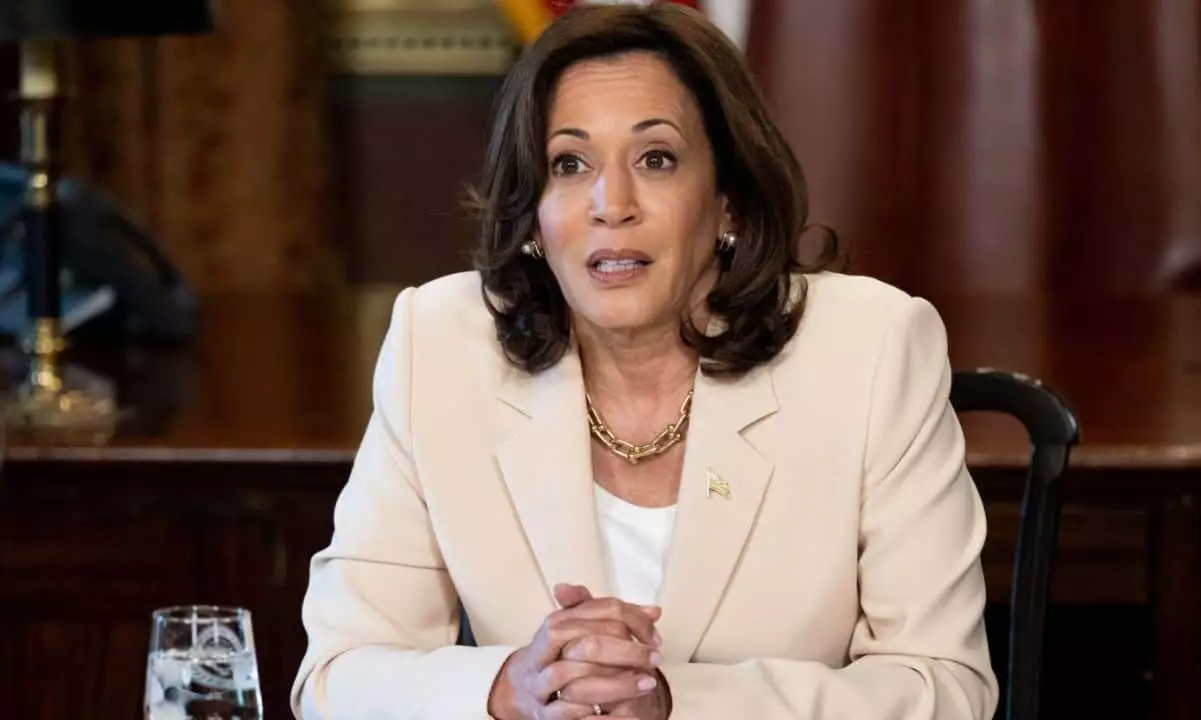The ongoing dialogue surrounding cryptocurrencies and digital assets has garnered significant attention from political figures, notably U.S. Vice President Kamala Harris. Her recent declarations aim to establish a supportive environment for crypto investors, particularly for black men who actively participate in this burgeoning market. This initiative is not just a nod to inclusivity; it is strategically aligned with the Democratic Party’s electoral agenda in the lead-up to the November elections. Harris’s campaign recently emphasized their commitment to creating a regulatory framework that would ideally safeguard crypto investors and broaden access to financial services for underrepresented communities.
The fact that 20% of black Americans have engaged with cryptocurrencies reflects a substantial interest, signaling a palpable shift in financial priorities within this demographic. Harris’s acknowledgment of this figure underscores her team’s recognition of the significant role digital assets might play in empowering individuals who have historically faced barriers to traditional banking systems. Nevertheless, while the vice president’s pledge is commendable in concept, the specifics of the regulatory framework remain vague. This lack of detail raises questions about the feasibility and effectiveness of Harris’s proposed initiatives, leaving observers to wonder exactly how her policies will manifest.
In her speech at an event in Erie, Pennsylvania, Harris’s failure to mention key terms like “blockchain” and “digital assets” has drawn criticism. It signals a potential disconnect between her administration’s aspirations and the realities of the crypto sector, which operates within a complex and rapidly evolving landscape. Critics point out that while intentions may be noble, a lack of precise language and understanding of the technology can lead to misguided policies.
This detail omission becomes pronounced when compared to the approach of former President Donald Trump, who has recently rebranded himself as the “Crypto President.” Trump’s political trajectory has included a notable shift towards embracing the crypto sector, offering concrete proposals aimed at fostering a supportive regulatory environment for digital assets should he return to office. His connection with the crypto community has strengthened, further illustrated by his family’s involvement in decentralized finance projects and actions like purchasing burgers in a crypto-accepting establishment.
The juxtaposition of these two political figures—Harris voicing support without substantial details, and Trump establishing clear initiatives and alliances—demonstrates the contrasting strategies at play. Harris’s team has criticized Trump for his perceived disregard for black Americans, thereby attempting to solidify her standing within the community. However, the effectiveness of their approach may be vastly diminished by their lack of actionable regulatory proposals.
Criticism of Harris has not been limited to mere policy vagueness; some observers have described her as unsuited for championing the cause of crypto. Bitcoin Magazine’s Nikolaus Hoffman labeled her “the worst candidate for Bitcoin,” suggesting that her promises are more performative than substantive. Such critiques are indicative of the uphill battle Harris faces not only to rally support among crypto investors but also to combat the lingering perception of the Biden administration’s anti-crypto stance, particularly under the helm of SEC Chair Gary Gensler, whose regulatory overreach has fostered distrust within the crypto community.
As the crypto marketplace continues to innovate and evolve, the political ties that weave through this sector become increasingly significant. Candidates who can articulate a clear vision for regulation that aligns with technological advancements may resonate more deeply with stakeholders. If Harris intends to prove her commitment to crypto investors, incorporating specific details about her proposed regulatory framework and actively engaging with the crypto community will be essential.
The rapidly changing landscape of digital assets calls for adaptable and informed political leadership. As the 2024 elections draw closer, Harris’s team has an opportunity to solidify their message and take a proactive stance towards establishing an equitable regulatory environment. For voters interested in crypto, clarity and commitment are paramount. This political juncture presents both challenges and opportunities, particularly for candidates like Harris who seek to engage with a demographic that stands to benefit greatly from supportive measures in the digital asset space.
The increased involvement of black men and other marginalized populations in cryptocurrency creates a unique platform for political discourse. How candidates like Kamala Harris respond to this growing trend will significantly impact not only the outcome of the upcoming elections but also the direction of digital asset policies for years to come. The successful navigation of these challenges could pave the way for a more inclusive financial future, one where policies actively reflect the realities of digital asset ownership and access.

